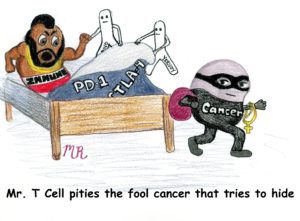Former President Jimmy Carter was diagnosed with stage IV malignant melanoma in 2015, an aggressive form of cancer that spread to his liver and his brain. Until recently, this would have been a death sentence. However, after surgery, radiation therapy, and a new type of drug treatment, Jimmy Carter is now cancer-free.
These new treatments do not directly target the cancer cells, but are remarkably saving the lives of stage IV cancer patients.
When these treatments work, the response is robust and long-lasting, leading some doctors to throw around the word “cure,” a seldom-used word in the cancer research field. These drugs, which harness the power of our immune system, have been clinically approved for several types of cancers and are rapidly being applied to many others in clinical trials. For patients and their families, this provides something very powerful—hope. Unfortunately, only 15 to 30% of people respond to the drugs, and currently no medical professional can predict who the lucky responders will be.
These new treatments are part of a burgeoning research field called cancer immunotherapy. Cancer cells can disguise themselves by adorning their surfaces with normal proteins, tricking our immune system into thinking they are normal cells. For years, researchers have been trying to design drugs that could strip away the disguises of cancer cells. Jim Allison and others recently discovered, however, that it is much more effective to train our immune system to ignore the disguises of the cancer cells than to force them to remove their masks.

To understand how this type of immunotherapy works, pretend you are an immune cell that is driving a miniature car inside a body. Researchers have been trying to get the immune cells to push the gas pedal down with more force. In doing so, they have been ignoring the other foot pressing the brake. With a foot on the brake, no matter how hard you slam the gas pedal, you won’t move forward. Recently, researchers realized that it is more important to release the brake than to slam the gas. In this context, the “brakes” are the proteins PD-1 and/or CTLA-4 on the immune cell, and they are responsible for allowing the cancer cells to hide in plain sight. The FDA-approved drugs pembrolizumab (KEYTRUDA®), nivolumab (OPDIVO®), and ipilimumab (YERVOY®) block PD-1 and CTLA-4, releasing the brakes, generating long-lasting effects, similar to vaccines.
While it is currently impossible to determine who will be treated successfully, some researchers think cancers with more mutations or with immune cells already in the tumor vicinity have a higher likelihood of successful treatment. Recent research has found that a common blood test could determine an increased likelihood of successful immunotherapy treatment in melanoma. Going forward, the focus will shift to accurately identifying potential responders like Jimmy Carter, and to decrease the percentage of non-responders, in order to preserve and extend life.
Edited by David Seamans